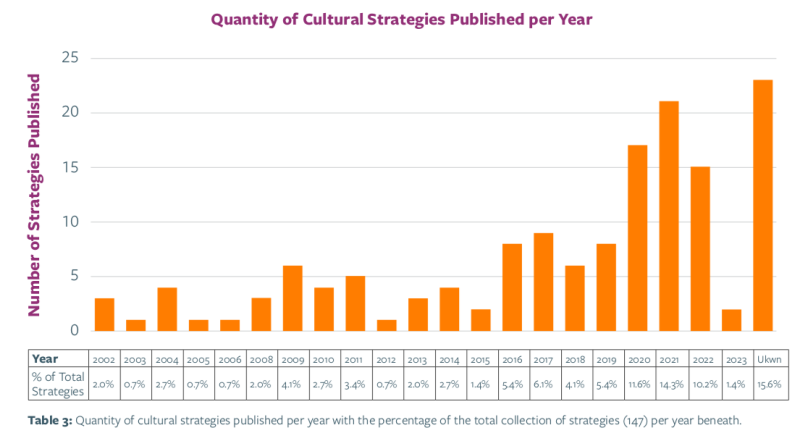
Suffolk is one of 162 English local authorities for which researchers could not readily locate a cultural strategy
Photo: Gordon Bell Photography
Under half of England’s local authorities have a cultural strategy
Analysis from the start of last year found less than half of England’s local authorities have a publicly available cultural strategy.
Less than half of England’s local authorities have a published cultural strategy available on their website, a new report has revealed.
A project team from the University of Southampton used publicly accessible local authority websites to identify cultural strategy and cultural compact documents in January 2023. The researchers, Professor Daniel Ashton and Makanani Bell found a total of 147 strategies, accounting for 152 local authorities due to several joint strategies.
There are 332 local authorities in England, made up of county, unitary, and district councils and London boroughs. The findings suggest 180 local authorities, or 54%, are not affiliated with a publicly available strategy.
READ MORE:
In the report, the two researchers said they encountered challenges locating, accessing and positioning some strategies.
Some websites or council documents said they had a cultural strategy, but the document could not be located. Ashton and Bell listed 162 local authorities under a ‘can’t find’ category, used for when a strategy may exist but searches did not locate it.
The other 18 local authorities without a published strategy were put under a ‘not yet’ cultural category, as some have stated the intention to develop one.
The researchers also said it was often hard to discern if a cultural strategy was new or updated. A total of 23 had no publication date, while 31 did not include what years the strategy covered.
Strategies that covered specific dates spanned between two and twenty years, with a five-year period the most frequently covered, accounting for 40 strategies. Of the 147 strategies the researchers located, 125 did not list consultants or authors.
A breakdown of published strategies per year suggests a spike in publications since 2019.
 Source: Professor Daniel Ashton and Makanani Bell, University of Southampton
Source: Professor Daniel Ashton and Makanani Bell, University of Southampton
“As we are identifying the most recent strategy for each place, this does not mean that more strategies were published in these years. It does, however, show that many places are either publishing or updating their cultural strategy,” the report says.
“Overall, the concentration of publications in the last three years, from 2020 to 2022, provides evidence of the drive for places to have current cultural strategies.”
Culture-led regeneration specialist organisation Five10Twelve, which works with local authorities across England to share best practices in the delivery of cultural development and placemaking programmes, called the report "a welcome and timely resource".
"We see first-hand the significant difference it makes for local authorities to have a well-developed cultural strategy in place to access funding, unlock investment, and deliver lasting impacts," said Five10Twelve CEO Samara Jones-Hall.
"With the well-reported squeeze on council budgets, it is even more vital that culture's unique role in delivering across a wide range of socio-economic measures – not just for culture – is based on strong evidence, solid data and a coherent strategy."
Recommendations
Ashton and Bell’s report also offers a series of recommendations on the role of cultural strategies.
These include suggesting that cultural strategies emphasise sharing and learning experiences and connecting with neighbouring local authorities to explore alignment and the pursuit of a common purpose. They also call for going beyond a list of policies and strategies and indicating when they were published, if they are time-bound, and how long they remain in alignment.
The researchers also recommend strategies to emphasise sharing learning and experiences, transparently reflect on what could be done differently and, where applicable, reference past strategies to reflect and evaluate the status of the aims.
An online database detailing which cultural strategies were located is publicly available.
Join the Discussion
You must be logged in to post a comment.